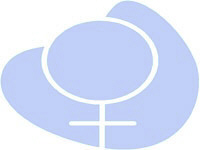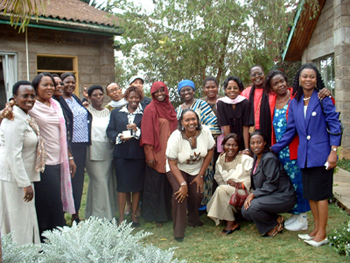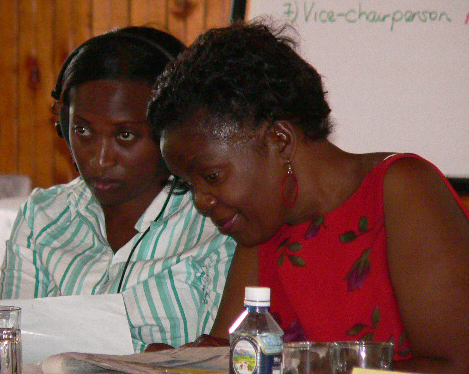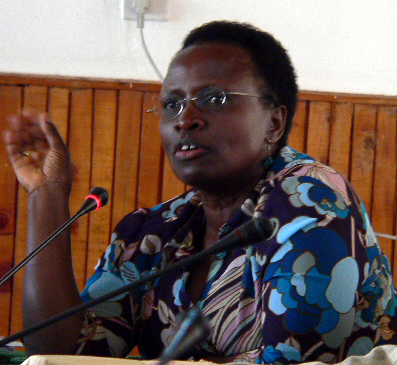|
October, 2006 |
||||
By Katerina Anfossi/RIF /FIRE Organized by ISIS-WICCE of Uganda, the “Great Lakes Institute on Women Building Peace and Good Neighborliness,” met September 19-21 in Nairobi Kenya with 40 women human rights activists to learn skills of sustainable peacebuilding. The women came from throughout the Great Lakes Region, which has struggled over the past 20 years with multiple wars, armed and political conflicts affecting thousands of people. Traveling from Burundi, the Democratic Republic of Congo, Kenya, Sudan, Rwanda, Uganda and Tanzania, the women were given the task of analyzing common elements that women face in armed conflicts, with the objective of developing actions for conflict prevention as well as processes for constructing a sustainable peace throughout the region. Participants not only shared strategies of resistance and survival in armed conflicts and wars, but also tackled the challenges of conflict prevention, and ending war and hostilities in which women often face greater discrimination and gender oppression.
The activists noted that it is not enough to identify the events and signals that lead to conflict; for them it is also necessary to recognize the multiple root causes of conflict that feed rivalries, especially those of a political nature. Elements that fuel confrontations include poverty; unequal distribution of wealth; poor infrastructure and lack of services; issues of control of natural resources; lack of access to education; corruption; destruction of the social infrastructure; trafficking of weapons; and control of the military and of political power. "It is necessary to recognize the roots of conflicts in order to achieve reconciliation," the women said. Likewise, religion, culture and ethnicity, while not direct causes of conflicts, often play a multidimensional role and have become the reason for and consequence of many atrocities committed during war, a vast majority of which are carried out by men.
Geography of pain and resistance A review of the recent history of armed conflicts suffered in the Great Lakes Region of Africa shows that for example, from 1993-2005 the country of Burundi was submerged in a bloody civil war which greatly affected over 300.000 people, the majority of whom were civilians. And althought the conflict has since ended, the impunity continues with no justice as yet for victims. The neighboring country of Rwanda is still recovering from the brutal genocide of April, 1994, in which nearly one million people lost their lives as the world watched in silence, and 250,000 women and girls were raped by armed combatants. The worldview on this tragedy has generally regarded it as a tribal and ethnic conflict, but this ignores the political complexities of the situation which actually played a stronger role in the development and eventual eruption of the conflict, including a power struggle over political and military control. Likewise, an armed conflict in northern Uganda that has been labeled by the world as “tribal rivalry” is in reality a war tied to political, cultural, social, religious and ideological components. The country has suffered decades of conflict going back to its 1962 independence from Britain, including the brutal rule of Idi Amin from 1975-1980. Later in the 1980s, a natural healer named Alice Lakwena led what she called the Holy Spirit Movement or the Uganda People's Defense Army until 1991, during which time thousands of people were killed, and which Lakwena justified as a means of "purifying" the nation from witchcraft. Eventually Lakwena was forced into exile and this movement became known as the Lord's Resistance Army (LRA) under the leadership of Joseph Kony. The LRA has been accused of committing multiple crimes against the tribal group Acholi in particular, who live in northern Uganda and the southern part of Sudan. Since 1987, nearly 30,000 children have been kidnapped and forced to become soldiers and military shields. Thousands of women, children and girls have been kidnapped and/or sold into sexual slavery, slave labor, forced marriage or prostitution. Since 1987, an estimated 2 million persons have been displaced in Uganda and about 100,000 persons killed in this war. According to a report by the BBC, this conflict is the second worst humanitarian emergency "forgotten by the world," after the conflict in the Democratic Republic of Congo. It wasn't until April 2004 when the UN Security Council passed a resolution that focused mainly on the need to respect the rights of children in the armed conflicts. In the Democratic Republic of Congo between 1998 and 2003, the devastation and suffering caused by the armed conflict there, also known as the "world war of Africa," continues today with ever more victims. Lack of food, and of potable water and medicine have created a serious humanitarian crisis in the country. The United Natoins has reported that some 3.3 million people have still not received any humanitarian assistance from international relief groups. For activists from the Democratic Republic of Congo, "The roots of the conflict are of a political-ethnic nature, which has cultivated a culture of violence and promotes extremism. In addition, the authorities are racist and xenophobic." On July 30, 2006, citizens could participate in the first multi-party elections since the DRC's independence in 1960. The results of the elections required a second vote, scheduled for October, 2006, which will determine the next government. However, uncertainty continues; therefore, although the country's population yearns for peace, people are generally not familiar with democratic processes, nor an atmosphere of freedom from violence. Also, armed militias continue to patrol everywhere. Sudan is the largest country in the African continent; its geography is as diverse as the population that inhabits the land. In 2003, a civil war broke out in the region of Darfur, which has led to more than 180,000 deaths directly due to the fighting, and thousands more have died from hunger, illnesses and homelessness that are devastating more than 2 million people there.
According
to a woman activist from Sudan who attended the peacebuilding workshop, the
information transmitted by mass media about the conflict tends to emphasize
the rivalries between ethnic groups. But for her the conflicts of Darfur are
a result of serious contradictions within the Sudanese state, with most of the development
concentrated in the zones near the Nile River among the Arab population, most
of whom are Muslim. People in this area exploit the resources of the other regions and
particularly in the South, but then abandon those populations, most of whom
are Black, for development efforts. Another problem is that the government, which is
opportunistic and corrupt, gives support to an armed group known as the "jingaweed"
or "horse devils," who are mainly comprised of local Arab tribes who
fight with the independent blacks, located mainly in the South.
Amnesty International reported in 2004 that in Darfur each day 16 women are raped by armed groups as they journey to get water. The report also noted that despite awareness of the danger, the women continue carrying out this task.
For activists from Tanzania, their country has faced internal conflicts related mainly to land tenancy and ownership, property rights, and the use and destruction of land and natural resources. One of the ongoing conflicts in that country is the tension between agricultural and pastoral groups, particularly in the areas of Arusha, Morogoro, Mara and Manyara, where the population does not hold official land titles, so the use of the land is determined through force, corruption and intimidation. In addition, Tanzanian women face sexual abuse, rape and unwanted pregnancies, and lack inheritance rights from their parents or the right to property with the loss of their husbands, which is often related to the practice of polygamy. Tanzania also shelters thousands of refugees who have fled from armed conflicts in bordering countries in the Great Lakes Region. Women of Tanzania say the challenges lie in developing the capacity to construct peace, and to understand that these struggles extend beyond armed conflict to achieving advances in women's rights, and in the implementation of local and international laws, and access to credit and financing, among others. Kenya, which was the site of this two-week workshop for activists, has likewise not escaped an escalation of violence in the region. In November 2004, there was an International Conference for Peace, Security, Democracy and Development in the Great Lakes Region, where they analyzed priorities related to regional cooperation. According to one of the participants, the priorities for each country in the region are diverse, and range from the local to national levels and also include challenges for countries struggling with armed conflicts. However, conference participants also identified common challenges and consequences related to land, compensation, maternal protection, and aid for the refugee population. As an outcome of the recent conference, participants identified eight key mechanisms or protocols needed for building sustainable peace in countries across the Great Lakes Region:
Key tasks of the training institute included acquisition of new skills and consolidating existing abilities for the construction of maintenance of a sustainable peace, according to the organizers. These skills include:
The participants hope to organize an advisory group of women specialized in human rights, who are able to investigate and document violations of human rights of women and also the promotion, protection and respect for those same rights. This group will also develop strategies for analysis, management and transformation of the effective participation of women in conflict resolution processes and peace construction. Having data separated by sex as a result of these efforts will help facilitate political decisions that address the needs of women in post-conflict situations and peace reconstruction processes, as well as help raise awareness of the specific consequences of armed conflicts on women's lives. It will also contribute to efforts for transitional justice and other post-conflict processes. The conference participants also analyzed mechanisms for the construction of post-conflict agendas, legal systems, and justice, ranging from local efforts to international tribunals and mechanisms such as the case of Rwanda with the War Crimes Tribunal and also UN Resolution 1325, which refers to increasing the representation of women in all levels of decisionmaking in the prevention, management and resolution of conflicts. At the end of the conference, participants approved a Declaration in which they condemned violations of women's human rights, particularly in official peace missions, which stated: "Considering the evidence of massive violations of the human rights of women that has emerged from the official peace missions and other humanitarian interventions in Darfur and other countries in the Great Lakes Region, we women who work for peacebuilding who met in Nairobi, condemn all types of violations, including the tribal conflicts in Molo, Kenya that have changed the lives of both groups, leaving thousands of injured and homes destroyed. We call on the governments involved to look for sustainable solutions to these conflicts."
FIRE-RIF (Feminist International Radio Endeavour) attended this workshop and
covered it for an international audience via internet radio.
Audio
Archives References: http://www.isis.or.ug/news.php?p=1&id=76 http://www.un.org/spanish/docs/sc04/scrl04.htm http://www.bbc.co.uk/bbcthree/tv/conflicts/sudan.shtml http://es.wikipedia.org/wiki/Darfur http://www.womenwarpeace.org/issues/prevention/prevention.htm
You
may use these photos, audios, but please cite as the
source:
|




